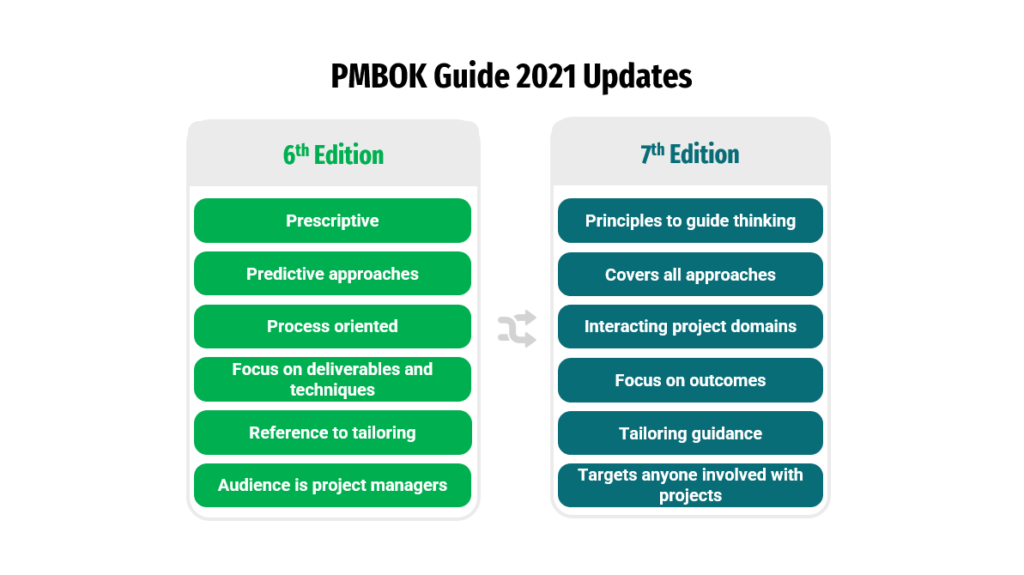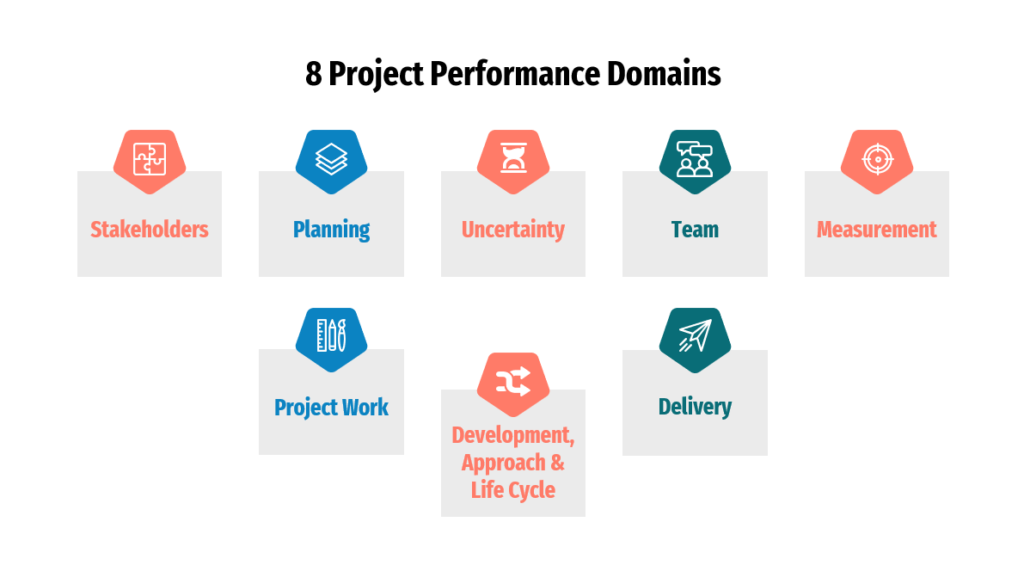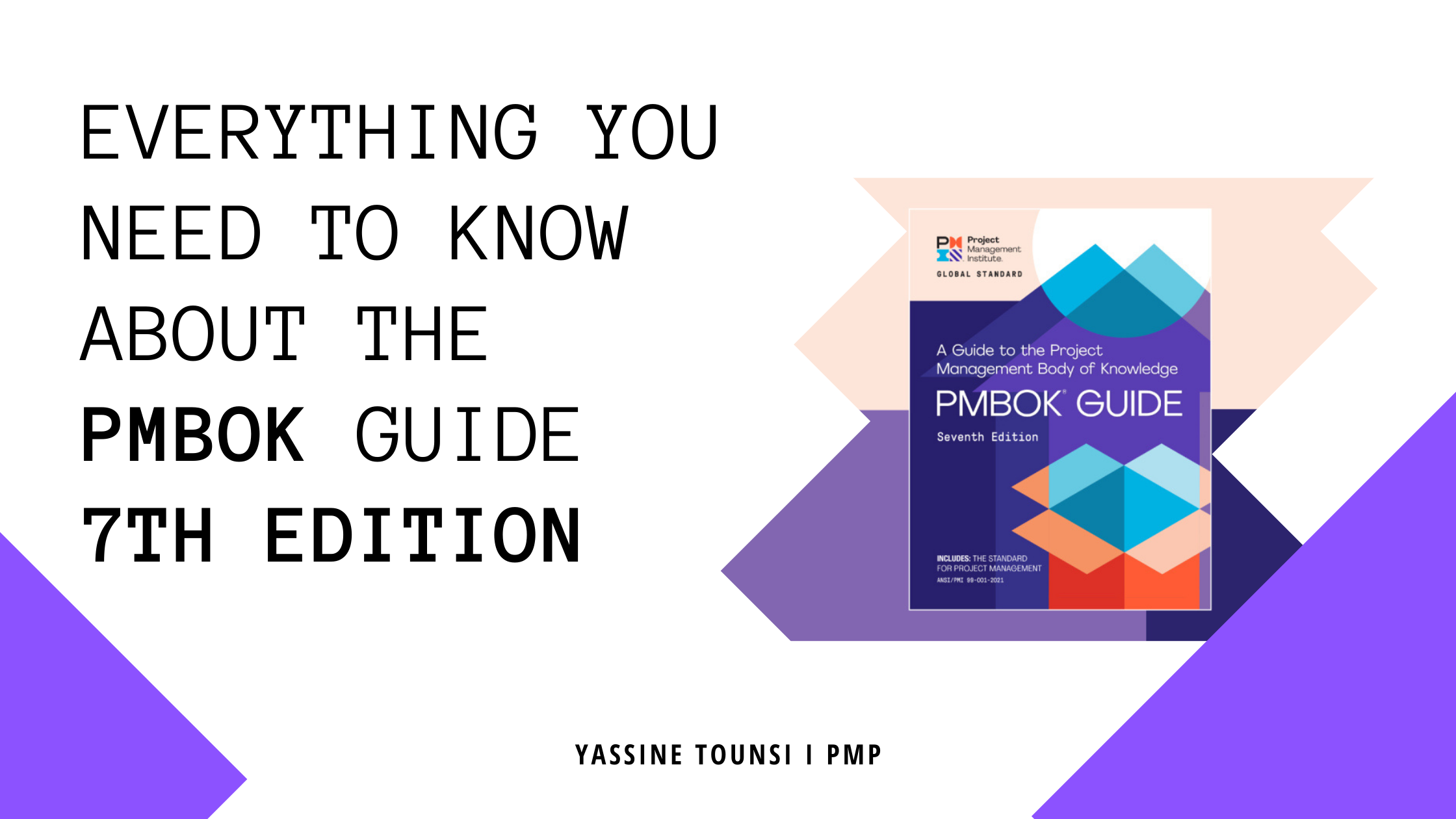Since the PMI announced that it will be releasing a majorly amended 7th edition of its reference guide, the Project Management Body of Knowledge (PMBOK), people were eager to know what changes will the PMP standard guideline go through, when will it be released, and what impact will these changes have on the Project Management Professional (PMP) certification exam.
Being curious myself, I recently attended a webinar by IIL (International Institute for Learning, Inc.) where Cyndi Snyder Dionisio, a PMBOK Seventh Edition Lead, covered the upcoming changes to the Project Management Institute’s Guide to the Project Management Body of Knowledge.
Keep on reading to get an insight into how the Seventh Edition of the PMBOK Guide has been reconstructed, what drove the new updates, when will it be released, and will it result in any changes to the PMP certification exam. The webinar tackled three main questions:
- Why is the PMBOK changing?
- How is it changing?
- And what will be the impact of these changes on the PMP and CAPM exams?
Why is the PMBOK changing?
Cyndi started the webinar by explaining what drove the PMBOK amendments in the first place, clarifying that “changes and updates were made to keep up with global market competition as organizations must adjust and projects must deliver.”
Taking into consideration that project management dynamics, frameworks, and trends are continuously evolving, PMBOK is subject to alterations every three to five years to keep its status as a relevant guide and reference to the rapid evolution of the project management practice field.
Relying on focus groups to gather feedback on what practitioners thought of the PMBOK Guide 6th edition, it was revealed that even though the guide was a highly-regarded project management reference, it was considered dry, hard to read, and hard to use in real life. Focus groups’ input also disclosed that the Project Management Body of Knowledge focused too much on the predictive method of work that it became out of date and out of step with practice.
As the go-to resource for project management professionals, the PMBOK had to adapt to the rapid technological enhancements. Taking into consideration feedback on the PMBOK 6th edition content, and in order to make sure it remains applicable, Cyndi stated that the seventh edition will support professionals’ need for flexibility by adopting a principle-based structure for the standard and performance domains, rather than Process Groups and Knowledge Areas.
Cyndi went on to unfold that the next PMBOK edition will be addressing all development approaches, without exception or preference for one over another. Moreover, instead of focusing solely on projects’ deliverables, the updated version of the guide will undertake project outcomes too. It will also provide specific considerations for tailoring the development approach and processes to the unique characteristics of each project. The upcoming PMBOK will also expand the range of its potential audience to target anyone involved with projects rather than exclusively being designed for project managers.

How is PMBOK changing?
The PMBOK 7th edition radical changes can be clearly exhibited by the fact that the guide will only include 250 pages in comparison to the 6th edition’s 700 pages.
Moving on to the 7th edition structure, Cyndi revealed that the PMBOK new version will still involve the Standard for Project Management along with the Guide to the Project Management Body of Knowledge. However, there will be some difference where the Standard for Project Management will be leading, consisting of an introduction and covering the Value Delivery System as well as 12 Project Management Principles: Stewardship, Team, Stakeholders, Value, Holistic Thinking, Leadership, Tailoring, Quality, Complexity, Opportunities & Threats, Adaptability & Resilience, and Change Management.
The Value Delivery System will be emphasizing valuable outcomes over deliverables. The Value Delivery System and principles will serve as a guide for project managers, team members, and stakeholders to deliver value to the organization and all involved parties.
The Standard will be followed by the Guide to the Project Management Body of Knowledge, which no longer tackles knowledge areas and process groups. Instead, it will be covering 8 Project performance domains: Team, Stakeholders, Life Cycle, Planning, Navigation and Ambiguity, Delivery, Performance, and Project Work, along with Tailoring, Models, Methods, and Artifacts.

Dedicating an entire section to tailoring different development approaches and processes, this PMBOK edition will address the selection of the suitable development approach, tailoring it for the organization and the project, continuously improving it, as well as tailoring performance domains.
According to Cyndi, the guide will offer an expanded list of tools including models, methods, and artifacts. Situational leadership, communication, motivation, change, complexity, and team development are some of the models incorporated in the 7th edition of the PMBOK. Changes also imply introducing data gathering and analysis, estimating, meetings and events, etc. as methods along with artifacts like logs and registers, plans, hierarchy charts, baselines, reports, agreements and contracts, and much more.
Both the standard and the guide will reflect a wide range of development approaches (predictive, adaptive, hybrid, etc.) to address practitioners’ needs and to lead them to be more flexible, proactive, and effective when embodying their projects’ requirements.
Does this mean you should stop using Process Groups and Knowledge Areas? Absolutely not. In fact, Process Groups are part of the introduced models and artifacts section of the guide’s 7th edition. The concepts from the Knowledge Areas will also be seen in multiple project performance domains. Since Process Groups and ITTOs worked well for many project managers, they can still be used by aligning them to the PMBOK 7th edition concepts.
What will be the impact of these changes on the PMP and CAPM exams?
According to the PMI, the 7th edition official release date will be the 1st of August 2021.
One of the most asked questions since the PMI’s announcement of PMBOK changes considerations, is how will the release of this updated edition impact both the PMP and the CAPM certification exams?
These concerns were addressed during the webinar where Cyndi explained that “contrary to popular belief, the PMP is not based on the PMBOK guide”. The certification exam is actually based on the exam content outline. Plus, since the 7th edition is not yet released, it will not be a source for the current PMP.
The new PMP exam, which was launched on the 2nd of January 2021, will continue to use the 6th edition as one of several references. Thus, the new edition of the PMBOK will not trigger a need to update the PMP, as it was recently updated. Moreover, the exam content already goes through a continuous improvement and maintenance process all year long regardless of PMBOK updates. The same goes for CAPM, the current exam will continue to be based on the Sixth Edition of the PMBOK as dictated by the Exam Content Outline.
You can order your copy of the long-awaited PMBOK 7th edition now!
[hubspot type=form portal=7718489 id=625c1053-4284-4340-a2e6-1f2fbaa9c729]
